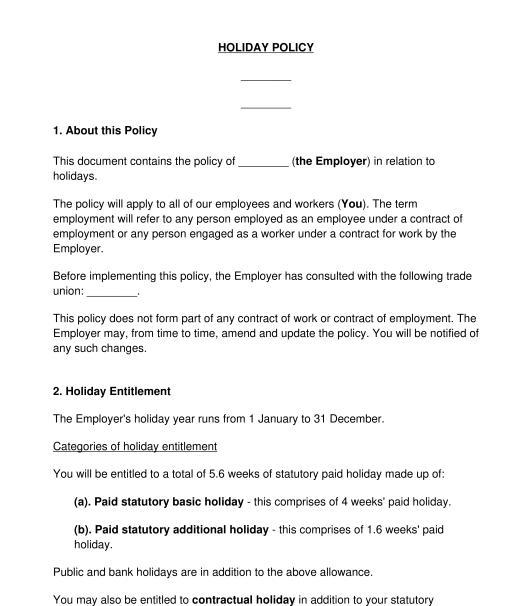 14/11/2025
14/11/2025

Answer a few questions and your document is created automatically.

Your document is ready! You will receive it in Word and PDF formats. You will be able to modify it.

 14/11/2025
14/11/2025
 Word and PDF
Word and PDF
 4 to 6 pages
4 to 6 pages
This policy can be used by an employer in Great Britain. The policy will set out the employer's procedures in relation to staff holidays. The policy will apply to all employees and workers* who are engaged by the employer.
The right to statutory annual leave applies to all workers and employees. More information about the different types of employment status can be found on the government website.
Holding a holiday policy can help an employer to:
A worker will be entitled to statutory holiday comprising of:
An employer may also offer additional contractual holiday, which would be set out in a worker's contract for work or contract of employment.
This policy may be used in conjunction with other important policies such as:
This document should be completed with the relevant information about the employer.
If the employer formally recognises a trade union in relation to its staff members, it may wish to consult or agree with the trade union about the policy. Sometimes, the terms of a collective agreement may require that a trade union or works council should be consulted in respect of any policy.
The policy is not a contractual document and does not need to be signed by a representative of the employer.
Once the policy has been finalised, the workforce should be made aware of its existence. It should be kept in a place which is easily accessible to workers. Typically this might be in a staff handbook or a staff intranet portal.
Information can also be found on:
You fill out a form. The document is created before your eyes as you respond to the questions.
At the end, you receive it in Word and PDF formats. You can modify it and reuse it.
A guide to help you: Differences between an Employment Contract, Service Contract and Consulting Agreement
Employer Holiday Policy - Template - Word & PDF
Country: United Kingdom